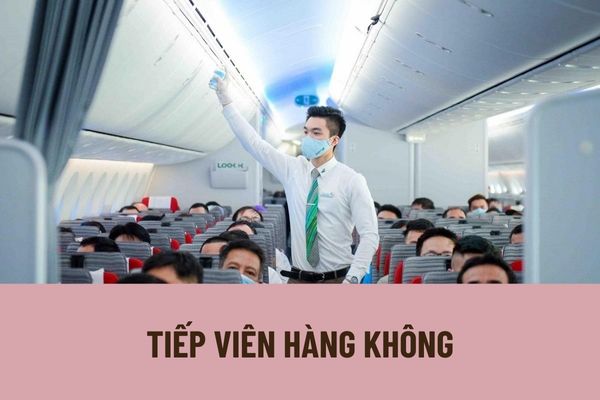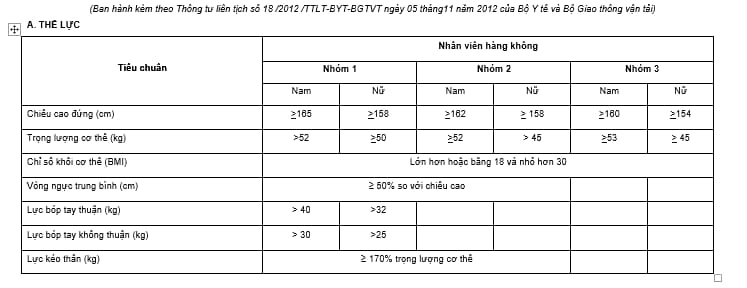Title: Is Myopia a Disqualification for Becoming a Flight Attendant? Physical Fitness Standards for Flight Attendants
Is it possible to work as a flight attendant if one is nearsighted?
According to subsection 6 of Section B, health standards for aviation staff issued with Joint Circular 18/2012/TTLT-BYT-BGTVT, which stipulates health standards for flight attendants:
6. Vision
6.1. Vision - General conditions
a) There must be no abnormalities in visual function and related eye structures. No acute or chronic pathological processes, sequelae from trauma, or surgery affecting the ability to fly and flight safety.
b) Comprehensive vision check must be carried out every 2 years for pilots under 40 years old and every 1 year for pilots aged 40 and over.
6.2 Vision – Functional requirements
a) Distance vision: Flight attendants with reduced vision must wear glasses while working and must always have spare glasses during their duty. To be issued a health certificate, flight attendants must have vision in each eye of 6/10 (without glasses) and 10/10 (with glasses). Alternatively, one eye must be 7/10 and the other eye 5/10 (without glasses). Or when viewing with both eyes (without glasses) no lower than 6/10.
b) Refractive error: At the first health examination, refractive error must not exceed ± 0.5 dp. In subsequent health examinations, it must not exceed +05/-08 dp. The difference in refractive error between the two eyes must not exceed 03 dp. Astigmatism must not exceed 03 dp.
c) Visual field: Normal.
d) Color vision: Normal.
Individuals with nearsightedness are still allowed to work as flight attendants.
However, flight attendants with reduced vision must wear glasses during work and always have spare glasses while on duty.
To be issued a health certificate, flight attendants must have vision in each eye of 6/10 (without glasses) and 10/10 (with glasses). Alternatively, one eye must be 7/10 and the other eye 5/10 (without glasses). Or when viewing with both eyes (without glasses) no lower than 6/10.

Flight attendants must hear normal speech from a distance of 5 meters and whispered speech from 0.5 meters (Image from the Internet).
Must flight attendants hear normal speech from a distance of 5 meters and whispered speech from 0.5 meters?
According to the regulations in subsection 5 of Section B, health standards for aviation staff issued with Joint Circular 18/2012/TTLT-BYT-BGTVT, flight attendants must meet the hearing requirements as follows:
- Must hear normal speech from a distance of 5 meters and whispered speech from 0.5 meters.
- A pure tone audiometry test must be conducted in the first health examination, thereafter every 2 years.
- In the initial health examination, each ear must hear a sound with an intensity of 20 dB at frequencies of 500, 1000, 2000 Hz, and 35 dB at 3000 Hz. If hearing is reduced by 05 dB from the upper limit or reduced in two test frequencies, pure tone audiometry must be performed at least once a year.
- In subsequent health examinations, each ear must hear a sound with an intensity of 35 dB at frequencies of 500, 1000, 2000 Hz, and 50 dB at 3000 Hz. If hearing is reduced by 05 dB from the upper limit or reduced in two test frequencies, pure tone audiometry must be performed at least once a year.
Physical standards to become a flight attendant?
According to Section A, health standards for aviation staff issued with Joint Circular 18/2012/TTLT-BYT-BGTVT, the regulations are as follows:

Based on the above regulations, to become a flight attendant, one must meet the physical condition standards in group 2 according to the table above.
What are the duties of flight attendants?
According to Article 7 of Circular 10/2018/TT-BGTVT (amended by Clause 4 Article 1 of Circular 35/2021/TT-BGTVT), the duties are stipulated as follows:
Duties according to the titles of aviation staff
1. Aviation security screening staff perform duties of checking, screening, supervising security, maintaining order, patrolling, guarding the airport, airfield, and other facilities as regulated by the specialized laws on aviation security.
2. Operations and equipment handling staff at restricted areas of the airport perform duties of equipment handling, operations at restricted areas of the airport as regulated by specialized laws on airport management and exploitation.
3. Ground handling staff perform one or several tasks: supervising, coordinating, serving passengers, luggage, cargo, and aircraft at the airport and outside the boundary of the airport after being licensed by the Civil Aviation Authority of Vietnam.
4. Rescue and firefighting staff at the airport perform rescue and firefighting duties in case of incidents or accidents at the airport.
5. Aviation staff titles as defined in Clauses 1, 2, 3, 4, 5, 6, 7, 8, 9, 10, 11, and 12 of Article 6 of this Circular perform duties as per the specialized regulations in aviation pertaining to aircraft, aircraft operations, and guaranteeing flight operations.
Based on the above regulations, flight attendants will perform duties as per the specialized aviation regulations concerning aircraft operations, management, and ensuring flight operations.
LawNet